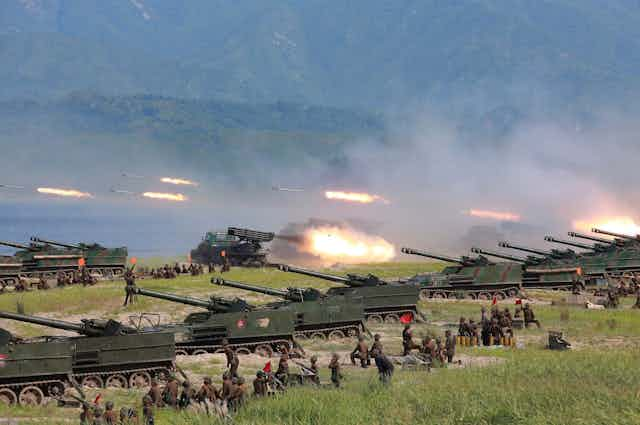North Korea’s sixth nuclear test on September 3 – of what was possibly a hydrogen bomb – prompted a flurry of Western media think pieces attempting to explain the past and predict the future.
Most left out important aspects of the current crisis, says analyst B.R. Myers, a South Korea-based academic expert on North Korean propaganda and author of The Cleanest Race: How North Koreans See Themselves and Why it Matters.
In this Q&A, The Conversation asked Professor Myers to explain what most in the West are missing about the North-South conflict.
You’re always complaining about press coverage of the Korean crisis. What is it you think people need to know more about?
A major problem is the mischaracterisation of the government in Seoul as liberal, as if it were no less committed to constitutional values and opposed to totalitarianism than the West German social democrats were in the Cold War. This makes Westerners think, “North Korea can’t take over the South without a war, but it knows it can’t win one, therefore it must now be arming only to protect itself”.
In fact, South Korea’s President Moon Jae-in has pledged commitment to a North-South confederation, and stressed his opposition to any use of military force against the North, no matter what happens. That makes Moon’s current displays of military hardware seem pretty meaningless.
If Seoul and Washington are playing a good-cop, bad-cop game, it’s a terrible idea. The more placid South Korea appears, the more US troops look like the only real obstacle to unification.
Western media applaud Moon’s soft-line declarations, and they like it when the South Korean man in the street says he finds Trump scarier than Kim Jong Un. But there is a danger of Kim taking all these things the wrong way.
You’ve written that some South Koreans admire the North, or at least, feel a sense of shared identity. Why is that? And can this persist in the current climate?
Many intellectuals here admire the North for standing up to the world. It’s a right-wing sort of admiration, really, for a resolute state that does what it says. More common than admiration are feelings of shared ethnic identity with the North. We are perhaps too blinkered by our own globalism to understand how natural they are.
But the average South Korean’s pan-Korean nationalism is rather shallow. Most people here want to see symbolic shows of reconciliation with the North – like a joint Olympic team in 2018 – but they don’t want unification, least of all under Kim Jong Un’s rule.
And they want the US Army to stay here in case he gets the wrong idea. It’s understandable enough, but this crisis will soon force them to pick one side, and one side only. “No ally is better than one’s own race,” President Kim Young Sam (president of South Korea from 1993 to 1998) said, which no West German chancellor would have dreamed of saying.
Washington has let this stuff slide for a long time, but people there are now asking themselves, “Must we really expose America to a nuclear threat in order to protect moderate Korean nationalists from radical nationalists?”
While the failures of the Vietnam War loom large, the US bungling of Korea is rarely discussed in “western media”. What’s the national memory of that war in both Koreas, and how is that impacting the current state of affairs?
That memory impacts the current situation less than one might think. Foreigners assume that because of the war, the two sides must dislike each other more than West and East Germans did. The opposite is the case. Some of my students say, “The North would never attack us, we’re the same people,” as if the war never happened. And North Korea would now be just as committed to unification if it hadn’t.
You mention the Vietnam War. In some ways that’s the more relevant and topical event right now. Kim Il Sung (leader of North Korea from its inception in 1948 until he died 1994, and the grandfather of current leader Kim Jong Un) was struck both by Washington’s decision not to use nukes on North Vietnam and by its general reluctance to go all out to win.
I’m sure the ease with which bare-footed Vietcong marched into Saigon in 1975 now strengthens Pyongyang’s conviction that the “Yankee colony” will not last long after the colonisers pull out.
In South Korea, meanwhile, conservatives are now loudly invoking the story of South Vietnam’s demise. They say, “There too you had a richer, freer state, and it fell only a few years after US troops pulled out. Let’s not make the same mistake”. They point worriedly to President Moon Jae-in’s own remark that he felt “delight” when predictions of US defeat in Vietnam came true.
How likely is a war?
I agree with those who say North Korea knows a nuclear war is unwinnable. I also think it fancies its chances of a peaceful takeover too highly to want to risk a premature invasion while US troops are here.
On the other hand, the North’s legitimacy derives almost wholly from its subjects’ perception of perfect strength and resolve. This makes it harder for Pyongyang to back down than it was for Moscow during the 1962 Cuban missile crisis.
Also, the North’s ideology glorifies the heart over the mind, instincts over consciousness, which makes rash decisions more likely to be made, even quite low down the military command structure. There is therefore a significant danger of some sort of limited clash at any time. But that has always been the case.

